湖北高考英语完成句子解题思路2014年修订版
- 格式:doc
- 大小:89.00 KB
- 文档页数:9
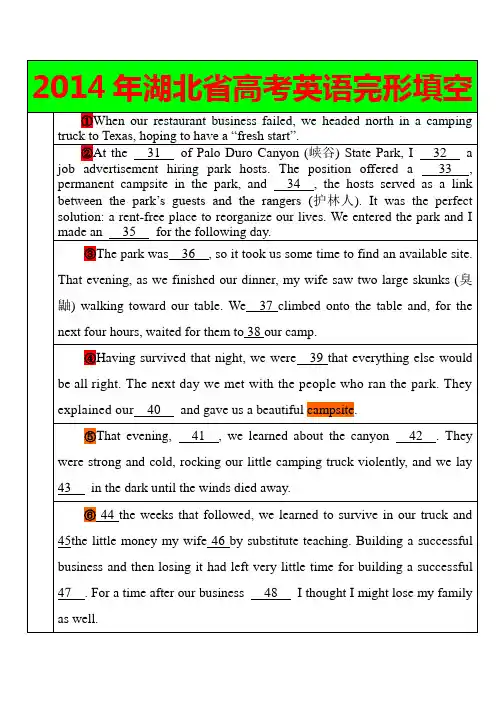
2014年湖北省高考英语完形填空①When our restaurant business failed, we headed north in a campingtruck to Texas, hoping to have a “fresh start”.②At the 31 of Palo Duro Canyon (峡谷) State Park, I 32 ajob advertisement hiring park hosts. The position offered a 33 , permanent campsite in the park, and 34 , the hosts served as a link between the park’s guests and the rangers (护林人). It was the perfect solution: a rent-free place to reorganize our lives. We entered the park and I made an 35 for the following day.③The park was 36 , so it took us some time to find an available site.That evening, as we finished our dinner, my wife saw two large skunks (臭鼬) walking toward our table. We 37 climbed onto the table and, for the next four hours, waited for them to 38 our camp.④Having survived that night, we were 39 that everything else wouldbe all right. The next day we met with the people who ran the park. They explained our 40 and gave us a beautiful campsite.⑤That evening, 41 , we learned about the canyon 42 . Theywere strong and cold, rocking our little camping truck violently, and we lay43 in the dark until the winds died away.⑥ 44 the weeks that followed, we learned to survive in our truck and45the little money my wife 46 by substitute teaching. Building a successful business and then losing it had left very little time for building a successful47 . For a time after our business 48 I thought I might lose my familyas well.⑦Living in the tiny 49 with no television, we sat close together readingand talking. One evening, standing under a jeweled sky, I found myself 50 for all the hardships. We had walked the trails and climbed the canyon walls.We had become a family!31 A back B edge C centre D entrance32A sponsored B published C noticed D answered33A safe B free C convenient D beautiful34A in return B in time C in short D in turn35A attempt B agreement C appeal D appointment36A crowded B dangerous C ideal D quiet37A repeatedly B immediately C eventually D calmly38A attack B leave C pass D search39A satisfied B determined C confident D aware40A responsibilities B requirements C circumstances D conditions41A moreover B therefore C meanwhile D however42A winds B snows C woods D trails43A shaking B quarrelling C mourning D aching44A After B Between C During D Beyond45A give away B hand out C live on D put aside46A borrowed B earned C posted D raised47A business B career C family D image48A started B failed C expanded D declined49A truck B park C house D camp50A desperate B ready C suitable D thankful【考点】考察故事类完型填空【文章大意】苦难是首歌!作者经营餐厅失败以后,全家坐着一辆货车去德克萨斯州重新开始生活。
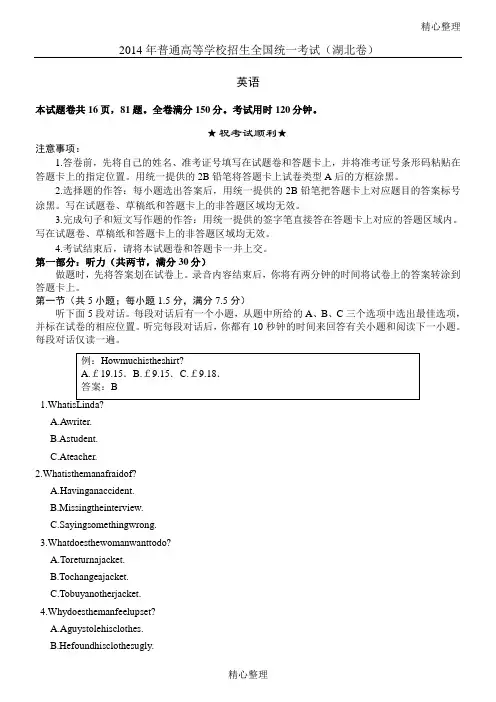
精心整理2014年普通高等学校招生全国统一考试(湖北卷)英语本试题卷共16页,81题。
全卷满分150分。
考试用时120分钟。
★祝考试顺利★注意事项:1.答卷前,先将自己的姓名、准考证号填写在试题卷和答题卡上,并将准考证号条形码粘贴在答题卡上的指定位置。
用统一提供的2B铅笔将答题卡上试卷类型A后的方框涂黑。
2.选择题的作答:每小题选出答案后,用统一提供的2B铅笔把答题卡上对应题目的答案标号3.4.B.Missingtheinterview.C.Sayingsomethingwrong.3.Whatdoesthewomanwanttodo?A.Toreturnajacket.B.Tochangeajacket.C.Tobuyanotherjacket.4.Whydoesthemanfeelupset?A.Aguystolehisclothes.B.Hefoundhisclothesugly.C.Someonesaidhewasugly.5.Whatdoesthewomanmean?A.Shedisbelievesherson.B.Shefeelsverysorryforherson.C.Shewantshersontouseanewkey.第二节(共15小题;每小题1.5分,满分22.5分)听下面5段对话或独白。
每段对话或独白后有几个小题,从题中所给的A、B、C三个选项中选出最佳选项,并标在试卷的相应位置。
听每段对话或独白前,你将有时间阅读各个小题,每小题5秒钟;听完后,各小题将给出5秒钟的作答时间。
每段对话或独白读两遍。
听第6段材料,回答第6、7题。
听第7听第810.Whatdoesthemanwanttotalkabout?A.Lucy’spoor health.B.Lucy’sschooleducation.C.Lucy’sworkperformance.11.WhatdidthecustomeratTable4dothatannoyedLucy?A.Hepraisedher.B.Hemadeacomplaint.C.Heorderedthespecialoffer.12.WhyisLucyinlowspirits?A.Shehasn’tmadeaplan.B.Shehasn’trealizedherdream.C.Shehasn’tbecomeagoodwaitress.听第9段材料,回答第13至16题。
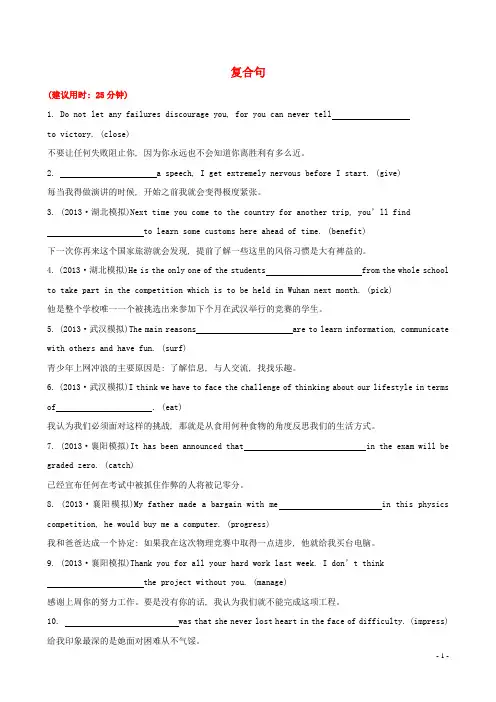
复合句(建议用时: 25分钟)1. Do not let any failures discourage you, for you can never tellto victory. (close)不要让任何失败阻止你, 因为你永远也不会知道你离胜利有多么近。
2. a speech, I get extremely nervous before I start. (give)每当我得做演讲的时候, 开始之前我就会变得极度紧张。
3. (2013·湖北模拟)Next time you come to the country for another trip, you’ll findto learn some customs here ahead of time. (benefit)下一次你再来这个国家旅游就会发现, 提前了解一些这里的风俗习惯是大有裨益的。
4. (2013·湖北模拟)He is the only one of the students from the whole school to take part in the competition which is to be held in Wuhan next month. (pick)他是整个学校唯一一个被挑选出来参加下个月在武汉举行的竞赛的学生。
5. (2013·武汉模拟)The main reasons are to learn information, communicate with others and have fun. (surf)青少年上网冲浪的主要原因是: 了解信息, 与人交流, 找找乐趣。
6. (2013·武汉模拟)I think we have to face the challenge of thinking about our lifestyle in terms of . (eat)我认为我们必须面对这样的挑战, 那就是从食用何种食物的角度反思我们的生活方式。
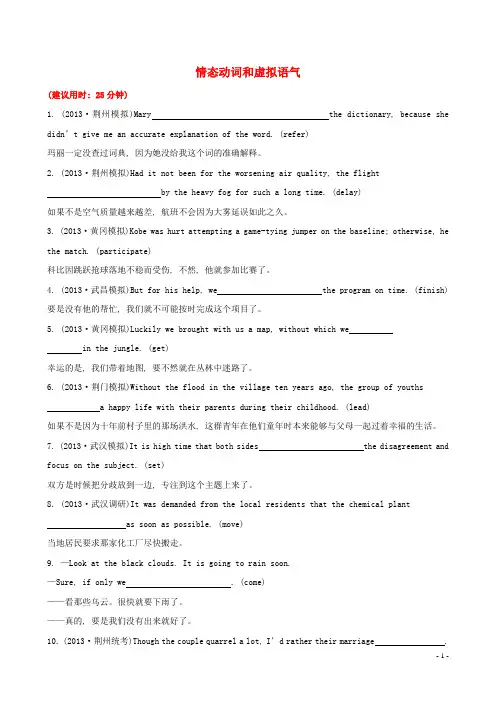
情态动词和虚拟语气(建议用时: 25分钟)1. (2013·荆州模拟)Mary the dictionary, because she didn’t give me an accurate explanation of the word. (refer)玛丽一定没查过词典, 因为她没给我这个词的准确解释。
2. (2013·荆州模拟)Had it not been for the worsening air quality, the flightby the heavy fog for such a long time. (delay)如果不是空气质量越来越差, 航班不会因为大雾延误如此之久。
3. (2013·黄冈模拟)Kobe was hurt attempting a game-tying jumper on the baseline; otherwise, he the match. (participate)科比因跳跃抢球落地不稳而受伤, 不然, 他就参加比赛了。
4. (2013·武昌模拟)But for his help, we the program on time. (finish) 要是没有他的帮忙, 我们就不可能按时完成这个项目了。
5. (2013·黄冈模拟)Luckily we brought with us a map, without which wein the jungle. (get)幸运的是, 我们带着地图, 要不然就在丛林中迷路了。
6. (2013·荆门模拟)Without the flood in the village ten years ago, the group of youthsa happy life with their parents during their childhood. (lead)如果不是因为十年前村子里的那场洪水, 这群青年在他们童年时本来能够与父母一起过着幸福的生活。
![整理]2014届高考英语《完形填空》复习方案二轮权威课件(湖北省专用):专题八 议论文型完形填空](https://uimg.taocdn.com/9dcd287bc281e53a5902ff06.webp)
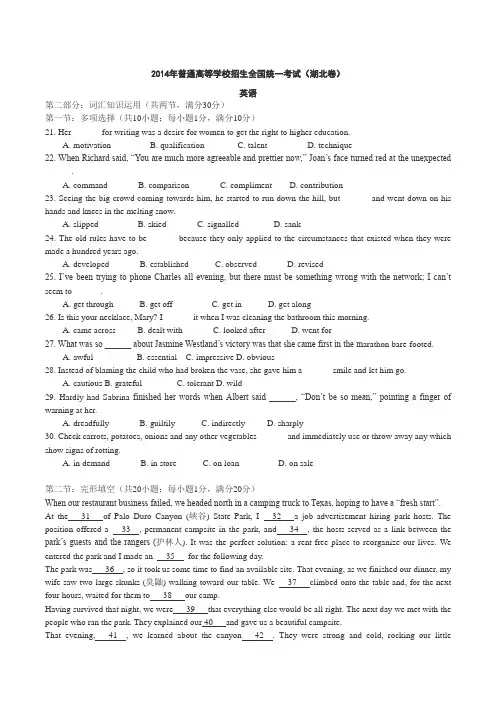
2014年普通高等学校招生全国统一考试(湖北卷)英语第二部分:词汇知识运用(共两节,满分30分)第一节:多项选择(共10小题;每小题1分,满分10分)21. Her ______ for writing was a desire for women to get the right to higher education.A. motivationB. qualificationC. talentD. technique22. When Richard said, “You are much more agreeable and prettier now,” Joan’s face turned red at the unexpected ______.A. commandB. comparisonC. complimentD. contribution23. Seeing the big crowd coming towards him, he started to run down the hill, but ______ and went down on his hands and knees in the melting snow.A. slippedB. skiedC. signalledD. sank24. The old rules have to be ______ because they only applied to the circumstances that existed when they were made a hundred years ago.A. developedB. establishedC. observedD. revised25. I’ve been trying to phone Charles all evening, but there must be something wrong with the network; I can’t seem to ______.A. get throughB. get offC. get inD. get along26. Is this your necklace, Mary? I ______ it when I was cleaning the bathroom this morning.A. came acrossB. dealt withC. looked afterD. went for27. What was so ______ about Jasmine Westland’s victory was that she came first in the m arathon bare-footed.A. awfulB. essentialC. impressiveD. obvious28. Instead of blaming the child who had broken the vase, she gave him a ______ smile and let him go.A. cautiousB. gratefulC. tolerantD. wild29. Hardly had Sabrina finished her words when Albert said ______, “Don’t be so mean,” pointing a finger of warning at her.A. dreadfullyB. guiltilyC. indirectlyD. sharply30. Check carrots, potatoes, onions and any other vegetables ______ and immediately use or throw away any which show signs of rotting.A. in demandB. in storeC. on loanD. on sale第二节:完形填空(共20小题;每小题1分,满分20分)When our restaurant business failed, we headed north in a camping truck to Texas, hoping to have a “fresh start”.At the 31 of Palo Duro Canyon (峡谷) State Park, I 32 a job advertisement hiring park hosts. The position offered a 33 , permanent campsite in the park, and 34 , the hosts served as a link between the park’s guests and the rangers (护林人). It was the perfect solution: a rent-free place to reorganize our lives. We entered the park and I made an 35 for the following day.The park was 36 , so it took us some time to find an available site. That evening, as we finished our dinner, my wife saw two large skunks (臭鼬) walking toward our table. We 37 climbed onto the table and, for the next four hours, waited for them to 38 our camp.Having survived that night, we were 39 that everything else would be all right. The next day we met with the people who ran the park. They explained our 40 and gave us a beautiful campsite.That evening, 41 , we learned about the canyon 42 . They were strong and cold, rocking our littlecamping truck violently, and we lay 43 in the dark until the winds died away.44 the weeks that followed, we learned to survive in our truck and 45 the little money my wife 46 by substitute teaching. Building a successful business and then losing it had left very little time for building a successful 47 . For a time after our business 48 I thought I might lose my family as well.Living in the tiny 49 with no television, we sat close together reading and talking. One evening, standing under a jeweled sky, I found myself 50 for all the hardships. We had walked the trails and climbed the canyon walls. We had become a family!31. A. back B. edge C. centre D. entrance32. A. sponsored B. published C. noticed D. answered33. A. safe B. free C. convenient D. beautiful34. A. in return B. in time C. in short D. in turn35. A. attempt B. agreement C. appeal D. appointment36. A. crowded B. dangerous C. ideal D. quiet37. A. repeatedly B. immediately C. eventually D. calmly38. A. attack B. leave C. pass D. search39. A. satisfied B. determined C. confident D. aware40. A. responsibilities B. requirements C. circumstances D. conditions41. A. moreover B. therefore C. meanwhile D. however42. A. winds B. snows C. woods D. trails43. A. shaking B. quarrelling C. mourning D. aching44. A. After B. Between C. During D. Beyond45. A. give away B. hand out C. live on D. put aside46. A. borrowed B. earned C. posted D. raised47. A. business B. career C. family D. image48. A. started B. failed C. expanded D. declined49. A. truck B. park C. house D. camp50. A. desperate B. ready C. suitable D. thankful第三部分:阅读理解(共20小题;每小题2分,满分40分)ABefore I had my son, I spent two years working with children with disabilities. I learned that shouting and threats of punishment would result in a disaster. Coming up against their behaviour could only make the job harder and their behaviour more extreme. I found something that worked, though.There was a very naughty boy in the nursery and a teacher who was generally very confident with the children was asked to take charge of him. One day the boy joined a session in the room next to mine. His appearance created an atmosphere of tension. He spent the entire session running around, hitting and kicking, and destroying property.I was in the craft room working with some other children when my co-worker told me that this boy’s te acher was in tears, and could not get control of the situation. As we were talking, the boy ran in. I told my co-worker that I would take care of him.I closed the door. He was full of energy, throwing things around and making a huge mess. But I could see that he was doing all these to annoy me. He needed connection, and this was the only way he knew how to ask for it. So I sat back down and kept quiet. Then he slowed down and began making a rocket. I talked to him about it. We continued like this for a few minutes before I slipped into the conversation:“So what happened today?”It was purely a question, no blame or anger in my tone. I believe that if I had criticized him, the gate that was slowly opening would have shut firmly closed. He told me that the t eacher didn’t let him do what he knew well due to safety but asked him to do what he disliked. He also admitted that he had enjoyed making her run around and saw it as a game. I explained that his teacher had not seen it as a game and was very upset. This again was stated simply as a fact. I suggested that next time he had a session, he talk about what he hoped to do at the start, which might be easier for everyone. He agreed and was quiet for a moment. Then he looked at me with tears in his eyes before quietly asking if he could go to find his teacher to apologize.51. The boy made trouble for his teacher because he ______.A. was accused of destroying propertyB. was told not to yell at other childrenC. was made to do things against his willD. was blamed for creating an air of tension52. Why didn’t the author do anything about the boy’s bad behavior at first?A. She didn’t want to make it worse.B. She didn’t mind the huge mess at all.C. She was tired of shouting and threats.D. She hadn’t thou ght of a coping strategy.53. The author managed to get the boy to talk to her by ______.A. playing games with himB. giving him a good suggestionC. describing his teacher’s feelingsD. avoiding making critical remarks54. Why did the boy have tears in his eyes in the end?A. He was sorry about his reputation.B. He was regretful about his behavior.C. He was fearful of the author’s warning.D. He was sad for the author’s misunderstanding.BLondon’s newest skyscraper (摩天大楼) is called the Shard and it cost about 430 million pounds to build. At a height of almost 310 metres, it is the tallest building in Europe. The Shard has completely changed the appearance of London. However, not everyone thinks that it is a change for the better.The Shard was designed by the famous Italian architect Renzo Piano. When he began designing the Shard for London, Piano wanted a very tall building that looked like a spire (尖顶). He wanted the glass surfaces to reflect the sky and the city. The sides of the buildin g aren’t regular. So the building has an unusual shape. It looks like a very thin, sharp piece of broken glass. And that is how the building got the name: the Shard. Piano says that the spire shape of the Shard is part of a great London tradition. The shape reminds him of the spires of the churches of London or the tall masts (桅杆) of the ships that were once on the river Thames.The Shard has 87 floors. At the top, there is an observatory. At the moment the building is empty, but eventually there will be a five-star hotel. There will also be top quality restaurants, apartments and offices.Before building work began, a lot of people didn’t want the Shard though the plans were approved. Now they are still unhappy about the Shard. Some critics say that such a tall skyscraper might be good in a city like New York, but not in London. They say that the best thing about the Shard is its spire shape. But that is the only thing. There is no decoration, only flat surfaces. The Egyptians did that 4,500 years ago. They also think the Shard is too big for London. It destroys the beauty of the city.Other critics don’t like what the Shard seems to represent. They say that the Shard shows how London is becoming more unequal. Only very rich people can afford to buy the expensive private apartments and stay in the hotel. But the people who live near the Shard are among the poorest in London. So the Shard seems a symbol of the division in society between the very rich and the poor.The Shard now dominates the London skyline. It is not certain, however, that ordinary London citizens will ever accept it as a valuable addition to the city.55. London’s newest skyscraper is called the Shard because of ______.A. its costB. its sizeC. its shapeD. its height56. When he designed the Shard, Piano wanted it to ______.A. change London’s skylineB. inherit London’s traditionC. imitate the Egyptian styleD. attract potential visitors57. The critics who refer to social division think the Shard ______.A. is only preferred by the richB. is intended for wealthy peopleC. is far away from the poor areaD. is popular only with Londoners58. Which would be the best title for the passage?A. The Shard: Cheers and ClapsB. The Shard: Work of a Great ArchitectC. The Shard: New Symbol of London?D. The Shard: A Change for the Better?CWorking with a group of baboons (狒狒) in the Namibian desert, Dr. Alecia Carter of the Department of Zoology, Cambridge University set baboons learning tasks involving a novel food and a familiar food hidden in a box. Some baboons were given the chance to watch another baboon who already knew how to solve the task, while others had to learn for themselves. To work out how brave or anxious the baboons were, Dr. Carter presented them either with a novel food or a threat in the form of a model of a poisonous snake.She found that personality had a major impact on learning. The braver baboons learnt, but the shy ones did not learn the task although they watched the baboon perform the task of finding the novel food just as long as the brave ones did. In effect, despite being made aware of what to do, they were still too shy to do what the experienced baboon did.The same held true for anxious baboons compared with calm ones. The anxious individuals learnt the task by observing others while those who were relaxed did not, even though they spent more time watching.This mismatch between collecting social information and using it shows that personality plays a key role in social learning in animals, something that has previously been ignored in studies on how animals learn to do things. The findings are significant because they suggest that animals may perform poorly in cognitive (认知的) tasks not because they aren’t clever enough to solve them, but because they are too shy or nervous to use the social information.The findings may impact how we understand the formation of culture in societies through social learning. If some individuals are unable to get information from others because they don’t associate with the knowledgeable individuals, or they are too shy to use the information once they have it, information may not travel between all group members, preventing the formation of a culture based on social learning.59. What is the first paragraph mainly about?A. The design of Dr. Carter’s research.B. The results of Dr. Carter’s research.C. The purpose of Dr. Carter’s research.D. The significance of Dr. Carter’s research.60. According to the research, which baboons are more likely to complete a new learning task?A. Those that have more experience.B. Those that can avoid potential risks.C. Those that like to work independently.D. Those that feel anxious about learning.61. Which best illustrates the “mismatch” mentioned in Paragraph 4?A. Some baboons are intelligent but slow in learning.B. Some baboons are shy but active in social activities.C. Some baboons observe others but don’t follow them.D. Some baboons perform new tasks but don’t concentrate.62. Dr. Carter’s findings indicate that our culture might be formed through ______.A. storing informationB. learning from each otherC. understanding different peopleD. travelling between social groupsDYou’ve flown halfway around the world; you’ve sniffed out this place that nobody in Falongland or Thailand seems to have ever heard of; so what on earth is there to do here? You consider this question as you sink into an old wooden beach chair that holds you above the sand.It was a long journey from Bangkok to Huaplee. By the time you found the bus station and got yourself sorted out, it took almost as long as the flight from Falongland.Huaplee is located just south of Hua Hin, about two hundred kilometres from Bangkok, down the west side of the Gulf of Thailand. Not many tourists find this place, and the ones that do wonder if finding it has been their purpose all along.There’s an apparent laziness that surrounds you here. It’s what this place offers, and it’s free of charge. The small waves that tap the shoreline seem to slow everything down. You settle into your beach chair in preparation for a long rest. You sit there and watch the sea.It’s early afternoon, so the cook comes out and asks what you’d like to eat this evening. Before long he’s rushed off to the market to buy the ingredients for whatever it was that you ordered—every meal fresh and to order. No menu here.There is no poolside noise here but just that wonderfully warm, clear blue sea. There’s no street noise. The only sounds are the murmurs of nature.For now you just count your blessings (福祉), listing them in the sand with your toe (脚趾). You don’t have to worry about being late for work. You don’t have to do anything.The beach to your right stretches off to the horizon (地平线), slowly narrowing to nothingness only to re-emerge again on your left, now steadily widening until it covers the chair beneath you. Sand to your left and sand to your right; it’s unbroken, endless. No start, no end, just sand, sun, and peace. Step off it, and you re-enter the world of traffic, stress, work, and hurry.Normally you’re the type who can’t sit still for more than ten minutes, but you’re on Huaplee Lazy Beach now and, in the right frame of mind, it stretches all the way around the world.“How could it take me so long to find it?” you wonder.63. When the author first went to Huaplee Beach, ______.A. he found it unworthwhileB. he failed to sort himself outC. he became sensitive to smellD. he had difficulty in finding it64. What is special about the food service at Huaplee Beach?A. No menu.B. Free food.C. Self service.D. Quick delivery.65. In the author’s opinion, a tourist can enjoy Huaplee Beach most when he ______.A. sits in a beach chairB. forgets his daily routineC. plans a detailed scheduleD. draws pictures in the sand66. What does the author imply by his question at the end of the passage?A. He shouldn’t have counted his blessings.B. He should have understood the wonder of nature.C. He shouldn’t have spent so much time on the trip.D. He should have come to the place earlier.EFor most city people, the elevator is an unremarkable machine that inspires none of the enthusiasm or interest that Americans afford trains, jets, and even bicycles. Dr. Christopher Wilk is a member of a small group of elevator experts who consider this a misunderstanding. Without the elevator, they point out, there could be no downtown skyscrapers or tall buildings, and city life as we know it would be impossible. In that sense, they argue, the elevator’s role in American history has been no less significant than that of cars. In fact, according to Wilk, the carand the elevator have been locked in a “secret war” for over a century, with cars making it possible for people to spread horizontally (水平地), and elevators pushing them toward life in close groups of towering vertical (垂直的) columns.If we tend to ignore the significance of elevators, it might be because riding in them tends to be such a brief, boring, and even awkward experience—one that can involve unexpectedly meeting people with whom we have nothing in common, and an u npleasant awareness of the fact that we’re hanging from a cable in a long passage.In a new book, Lifted, German journalist and cultural studies professor Andreas Bernard directed all his attention to this experience, studying the origins of elevator and its relationship to humankind and finding that riding in an elevator has never been a totally comfortable experience. “After 150 years, we are still not used to it,” Bernard said. “We still have not exactly learned to cope with the mixture of closeness and displeasure.” That mixture, according to Bernard, sets the elevator ride apart from just about every other situation we find ourselves in as we go about our lives.Today, as the world’s urban population explodes, and cities become more crowded, taller, and more crowded, America’s total number of elevators—900,000 at last count, according to Elevator World magazine’s “2012 Vertical Transportation Ind ustry”—are a force that’s becoming more important than ever. And for the people who really, really love them, it seems like high time that we looked seriously at just what kind of force they are.67. What does the underlined word “this” in Paragraph 1 ref er to?A. The general view of elevators.B. The particular interests of experts.C. The desire for a remarkable machine.D. The enthusiasm for transport vehicles.68. The author’s purpose in mentioning cars is ______.A. to contrast their functions wi th elevators’B. to emphasize the importance of elevatorsC. to reveal their secret war against elevatorsD. to explain people’s preference for elevators69. According to Prof. Bernard, what has made the elevator ride different from other life experiences?A. Vertical direction.B. Lack of excitement.C. Little physical space.D. Uncomfortable conditions.70. The author urges readers to consider ______.A. the exact number of elevator loversB. the serious future situation of elevatorsC. the role of elevators in city developmentD. the relationship between cars and elevators第四部分:书面表达(共两节,满分50分)第一节:完成句子(共10小题;每小题2分,满分20分)71. The community college has to cut down on staff _________. (save)为了省钱,那所社区学院只好裁员。
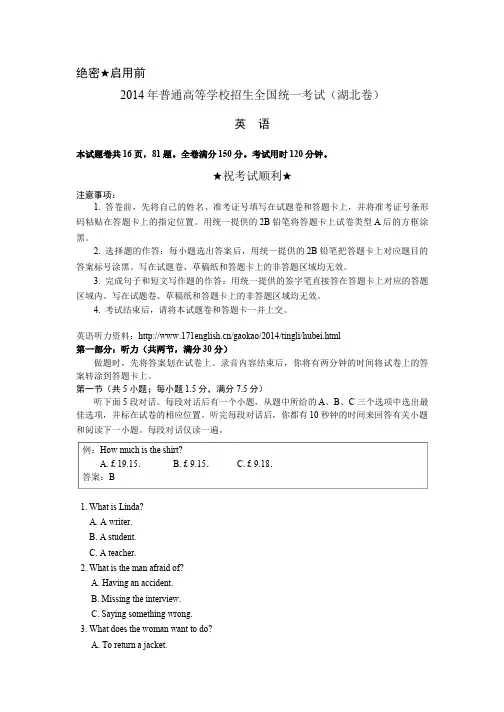
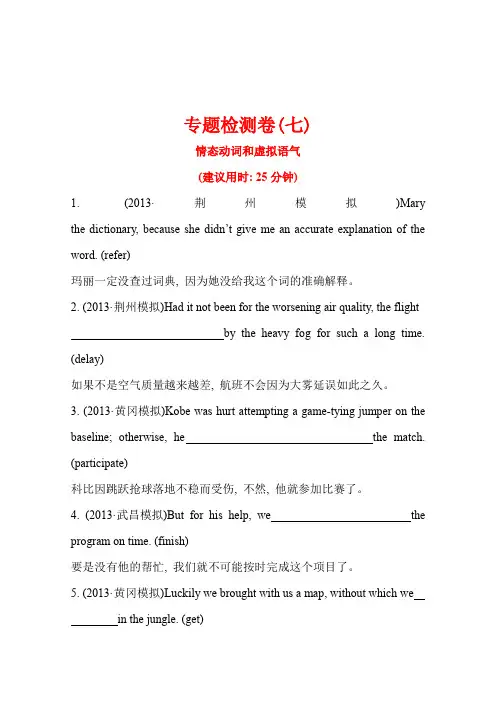
专题检测卷(七)情态动词和虚拟语气(建议用时: 25分钟)1. (2013·荆州模拟)Mary the dictionary, because she didn’t give me an accurate explanation of the word. (refer)玛丽一定没查过词典, 因为她没给我这个词的准确解释。
2. (2013·荆州模拟)Had it not been for the worsening air quality, the flightby the heavy fog for such a long time. (delay)如果不是空气质量越来越差, 航班不会因为大雾延误如此之久。
3. (2013·黄冈模拟)Kobe was hurt attempting a game-tying jumper on the baseline; otherwise, he the match. (participate)科比因跳跃抢球落地不稳而受伤, 不然, 他就参加比赛了。
4. (2013·武昌模拟)But for his help, we the program on time. (finish)要是没有他的帮忙, 我们就不可能按时完成这个项目了。
5. (2013·黄冈模拟)Luckily we brought with us a map, without which wein the jungle. (get)幸运的是, 我们带着地图, 要不然就在丛林中迷路了。
6. (2013·荆门模拟)Without the flood in the village ten years ago, the group of youthsa happy life with their parents during their childhood. (lead) 如果不是因为十年前村子里的那场洪水, 这群青年在他们童年时本来能够与父母一起过着幸福的生活。

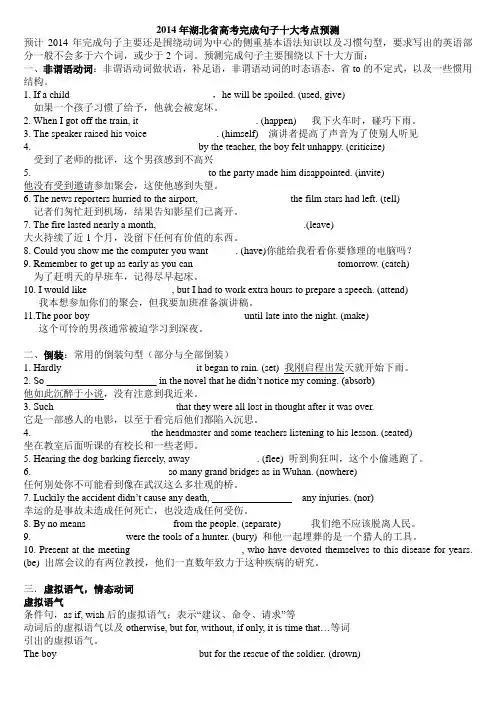
2014年湖北省高考完成句子十大考点预测预计2014年完成句子主要还是围绕动词为中心的侧重基本语法知识以及习惯句型,要求写出的英语部分一般不会多于六个词,或少于2个词。
预测完成句子主要围绕以下十大方面:一、非谓语动词:非谓语动词做状语,补足语,非谓语动词的时态语态,省to的不定式,以及一些惯用结构。
1. If a child ____________________________,he will be spoiled. (used, give)如果一个孩子习惯了给予,他就会被宠坏。
2. When I got off the train, it _______________________. (happen) 我下火车时,碰巧下雨。
3. The speaker raised his voice _____________. (himself) 演讲者提高了声音为了使别人听见4. _________________________________by the teacher, the boy felt unhappy. (criticize)受到了老师的批评,这个男孩感到不高兴5. ___________________________________to the party made him disappointed. (invite)他没有受到邀请参加聚会,这使他感到失望。
6. The news reporters hurried to the airport, ________________ the film stars had left. (tell)记者们匆忙赶到机场,结果告知影星们已离开。
7. The fire lasted nearly a month, _____________________________.(leave)大火持续了近1个月,没留下任何有价值的东西。
8. Could you show me the computer you want _____. (have)你能给我看看你要修理的电脑吗?9. Remember to get up as early as you can ____________________________ tomorrow. (catch)为了赶明天的早班车,记得尽早起床。
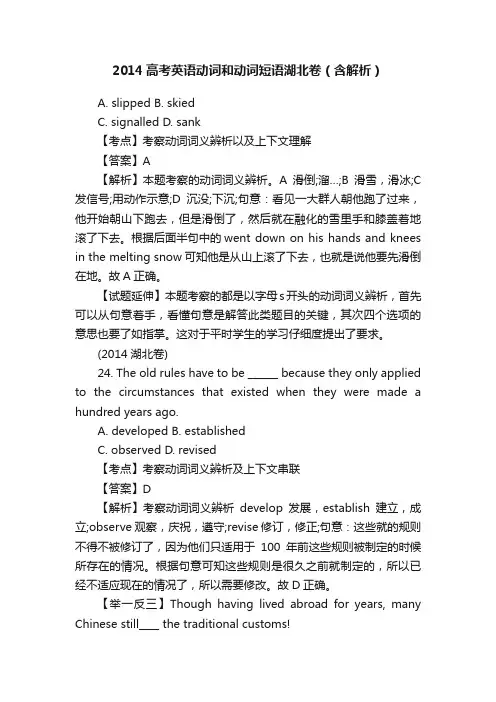
2014高考英语动词和动词短语湖北卷(含解析)A. slippedB. skiedC. signalledD. sank【考点】考察动词词义辨析以及上下文理解【答案】A【解析】本题考察的动词词义辨析。
A滑倒;溜…;B滑雪,滑冰;C 发信号;用动作示意;D沉没;下沉;句意:看见一大群人朝他跑了过来,他开始朝山下跑去,但是滑倒了,然后就在融化的雪里手和膝盖着地滚了下去。
根据后面半句中的went down on his hands and knees in the melting snow可知他是从山上滚了下去,也就是说他要先滑倒在地。
故A正确。
【试题延伸】本题考察的都是以字母s开头的动词词义辨析,首先可以从句意着手,看懂句意是解答此类题目的关键,其次四个选项的意思也要了如指掌。
这对于平时学生的学习仔细度提出了要求。
(2014湖北卷)24. The old rules have to be ______ because they only applied to the circumstances that existed when they were made a hundred years ago.A. developedB. establishedC. observedD. revised【考点】考察动词词义辨析及上下文串联【答案】D【解析】考察动词词义辨析develop发展,establish建立,成立;observe观察,庆祝,遵守;revise修订,修正;句意:这些就的规则不得不被修订了,因为他们只适用于100年前这些规则被制定的时候所存在的情况。
根据句意可知这些规则是很久之前就制定的,所以已经不适应现在的情况了,所以需要修改。
故D正确。
【举一反三】Though having lived abroad for years, many Chinese still____ the traditional customs!A.performB.possessC.observeD.support〖答案〗C〖考点〗考查动词意义。
2014年湖北省全国各地高考英语试题及详细解析第一部分:听力(共两节,满分30分)1.(1.5分)What is Linda?A.A writer.B.A student.C.A teacher.2.(1.5分)What is the man afraid of?A.Having an accident.B.Missing the interview.C.Saying something wrong.3.(1.5分)What does the woman want to do?A.To return a jacket.B.To change a jacket.C.To buy another jacket.4.(1.5分)Why does the man feel upset?A.A guy stole his clothes.B.He found his clothes ugly.C.Someone said he was ugly.5.(1.5分)What does the woman mean?A.She disbelieves her son.B.She feels very sorry for her son.C.She wants her son to use a new key.6.(3分)听第6段材料,回答第6、7题.6.Why isn't Jenny at the store?A.She left work early.B.She's late for work.C.She's been out of work.7.How does the man feel about Jenny?A.Angry.B.Curious.C.Concerned.8.(3分)听第7段材料,回答第8、9题.8.What is lying on the railway tracks?A.A man.B.A rock.C.A trunk.9.What are the speakers about to do?A.To move the rock.B.To wave the T﹣shirt.C.To find something red.10.(4.5分)听第8段材料,回答第10至12题.10.What does the man want to talk about?A.Lucy's poor health.B.Lucy's school education.C.Lucy's work performance.11.What did the customer at Table 4 do that annoyed Lucy?A.He praised her.B.He made a complaint.C.He ordered the special offer.12.Why is Lucy in low spirits?A.She hasn't made a plan.B.She hasn't realized her dream.C.She hasn't become a good waitress.13.(6分)听第9段材料,回答第13至16题.13.How does the woman think Mark feels?A.Anxious.B.Unhappy.C.Frightened.14.What was Catherine doing when the speakers got home?A.Reading her books.B.Playing with her friends.C.Chatting with the operator.15.What does the woman want to ensure?A.Mark can pass the exam.B.Mark can help people in need.C.Mark can apply what he's learned.16.What will the speakers do for Mark?A.Keep a record of his reactions.B.Create an unexpected situation.C.Write down their own experiences.17.(6分)听第10段材料,回答第17至20题.17.When did the magician first perform professionally?A.In 1964.B.In 1968.C.In 1972.18.What made the magician world famous?A.His TV show.B.His global tours.C.His teaching job.19.Which does the magician think is his greatest achievement?A.Project Magic.B.Box office records.C.The Magic of ABC.20.How is the magician different from other magicians?A.He practises hard.B.He believes in wonder.C.He started his career early.第二部分:词汇知识运用第一节多项选择(共10小题;每小题1分,满分10分)从A、B、C、D四个选项中,选出可以填入空白处的最佳选项,并在答题卡上将该项涂黑.21.(1分)Her ______ for writing was a desire for women to get the right to higher education.()A.motivationB.qualificationC.talentD.technique22.(1分)When Richard said,"You are much more agreeable and prettier now,"Joan's face turned red at the unexpected ______.()mandparisonplimentD.contribution23.(1分)Seeing the big crowd coming towards him,he started to run down the hill,but ______ and went down on his hands and knees in the melting snow.()A.slippedB.skiedC.signalledD.sank24.(1分)The old rules have to be ______ because they only applied to the circumstances that existed when they were made a hundred years ago.()A.developedB.establishedC.observedD.revised25.(1分)I've been trying to phone Charles all evening,but there must be something wrong with the network;I can't seem to ______.()A.get throughB.get offC.get inD.get along26.(1分)Is this your necklace,Mary?I ______ it when I was cleaning the bathroom this morning.()A.came acrossB.dealt withC.looked afterD.went for27.(1分)What was so ______ about Jasmine Westland's victory was that she came first in the marathon bare﹣footed.()A.awfulB.essentialC.impressiveD.obvious28.(1分)Instead of blaming the child who had broken the vase,she gave him a ______ smile and let him go.()A.cautiousB.gratefulC.tolerantD.wild29.(1分)Hardly had Sabrina finished her words when Albert said ______,"Don't be so mean,"pointing a finger of warning at her.()A.dreadfullyB.guiltilyC.indirectlyD.sharply30.(1分)Check carrots,potatoes,onions and any other vegetables ______ and immediately use or throw away any which show signs of rotting.()A.in demandB.in storeC.on loanD.on sale第二节:完形填空(共1小题;每小题20分,满分20分)31.(20分)阅读下面短文,从短文后各题所给的四个选项(A、B、C和D)中,选出可以填入空白处的最佳选项,并在答题卡上将该项涂黑.When our restaurant business failed,we headed north in a camping truck to Texas,hoping to have a"fresh start".At the (31)of Palo Duro Canyon (峡谷) State Park,I(32) a job advertisement hiring park hosts.The position offered a(33),permanent campsite in the park,and (34),the hosts served as a link between the park's guests and the rangers (护林人).It was the perfect solution:a rent﹣free place to reorganize our lives.We entered the park and I made an (35)for the following day.The park was(36),so it took us some time to find an available site.That evening,as we finished our dinner,my wife saw two large skunks (臭鼬) walking toward our table.We(37)climbed onto the table and,for the next four hours,waited for them to(38)our camp.Having survived that night,we were(39)that everything else would be all right.The next day we met with the people who ran the park.They explained our (40)and gave us a beautiful campsite.That evening,(41),we learned about the canyon(42).They were strong and cold,rocking our little camping truck violently,and we lay (43)in the dark until the winds died away.(44)the weeks that followed,we learned to survive in our truck and(45)the little money my wife(46)by substitute teaching.Building a successful business and then losing it had left very little time for building a successful(47).For a time after our business(48)I thought I might lose my family as well.Living in the tiny(49)with no television,we sat close together reading and talking.One evening,standing under a jeweled sky,I found myself(50)for all the hardships.We had walked the trails and climbed the canyon walls.We had become a family!31.A.back B.edge C.centre D.entrance32.A.sponsored B.published C.noticed D.answered33.A.safe B.free C.convenient D.beautiful34.A.in return B.in time C.in short D.in turn35.A.attempt B.agreement C.appeal D.appointment36.A.crowded B.dangerous C.ideal D.quiet37.A.repeatedly B.immediately C.eventually D.calmly38.A.attack B.leave C.pass D.search39.A.satisfied B.determined C.confident D.aware40.A.responsibilities B.requirements C.circumstances D.conditions41.A.moreover B.therefore C.meanwhile D.however42.A.winds B.snows C.woods D.trails43.A.shaking B.quarrelling C.mourning D.aching44.A.After B.Between C.During D.Beyond45.A.give away B.hand out C.live on D.put aside46.A.borrowed B.earned C.posted D.raised47.A.business B.career C.family D.image48.A.started B.failed C.expanded D.declined49.A.truck B.park C.house D.camp50.A.desperate B.ready C.suitable D.thankful.第三部分.阅读理解(共5小题;每小题8分,满分40分)阅读下列短文,从每篇短文后各题所给的四个选项(A、B、C和D)中,选出最佳选项,并在答题卡上将该项涂黑.51.(8分)Before I had my son,I spent two years working with children with disabilities.I learned that shouting and threats of punishment would result in a ing up against their behaviour could only make the job harder and their behaviour more extreme.I found something that worked,though.There was a very naughty boy in the nursery and a teacher who was generally very confident with the children was asked to take charge of him.One day the boy joined a session in the room next to mine.His appearance created an atmosphere of tension.He spent the entire session running around,hitting and kicking,and destroying property.I was in the craft room working with some other children when my co﹣worker told me that this boy's teacher was in tears,and could not get control of the situation.As we were talking,the boy ran in.I told my co﹣worker that I would take care of him.I closed the door.He was full of energy,throwing things around and making a huge mess.But I could see that he was doing all these to annoy me.He needed connection,and this was the only way he knew how to ask for it.So I sat back down and kept quiet.Then he slowed down and began making a rocket.I talked to him about it.We continued like this for a few minutes before I slipped into the conversation:"So what happened today?"It was purely a question,no blame or anger in my tone.I believe that if I had criticized him,the gate that was slowly opening would have shut firmly closed.He told me that the teacher didn't let him do what he knew well due to safety but asked him to do what he disliked.He also admitted that he had enjoyed making her run around and saw it as a game.I explained that his teacher had not seen it as a game and was very upset.This again was stated simply as a fact.I suggested that next time he had a session,he talk about what he hoped to do at the start,which might be easier for everyone.He agreed and was quiet for a moment.Then he looked at me with tears in his eyes before quietly asking if he could go to find his teacher to apologize.51.The boy made trouble for his teacher because he.A.was accused of destroying propertyB.was told not to yell at other childrenC.was made to do things against his willD.was blamed for creating an air of tension52.Why didn't the author do anything about the boy's bad behavior at first?A.She didn't want to make it worse.B.She didn't mind the huge mess at all.C.She was tired of shouting and threats.D.She hadn't thought of a coping strategy.53.The author managed to get the boy to talk to her by.A.playing games with himB.giving him a good suggestionC.describing his teacher's feelingsD.avoiding making critical remarks54.Why did the boy have tears in his eyes in the end?A.He was sorry about his reputation.B.He was regretful about his behavior.C.He was fearful of the author's warning.D.He was sad for the author's misunderstanding.55.(8分)London's newest skyscraper (摩天大楼) is called the Shard and it cost about 430 million pounds to build.At a height of almost 310metres,it is the tallest building in Europe.The Shard has completely changed the appearance of London.However,not everyone thinks that it is a change for the better.The Shard was designed by the famous Italian architect Renzo Piano.When he began designing the Shard for London,Piano wanted a very tall building that looked like a spire (尖顶).He wanted the glass surfaces to reflect the sky and the city.The sides of the building aren't regular.So the building has an unusual shape.It looks like a very thin,sharp piece of broken glass.And that is how the building got the name:the Shard.Piano says that the spire shape of the Shard is part of a great London tradition.The shape reminds him of the spires of the churches of London or the tallmasts (桅杆) of the ships that were once on the river Thames.The Shard has 87floors.At the top,there is an observatory.At the moment the building is empty,but eventually there will be a five﹣star hotel.There will also be top quality restaurants,apartments and offices.Before building work began,a lot of people didn't want the Shard though the plans were approved.Now they are still unhappy about the Shard.Some critics say that such a tall skyscraper might be good in a city like New York,but not in London.They say that the best thing about the Shard is its spire shape.But that is the only thing.There is no decoration,only flat surfaces.The Egyptians did that 4,500years ago.They also think the Shard is too big for London.It destroys the beauty of the city. Other critics don't like what the Shard seems to represent.They say that the Shard shows how London is becoming more unequal.Only very rich people can afford to buy the expensive private apartments and stay in the hotel.But the people who live near the Shard are among the poorest in London.So the Shard seems a symbol of the division in society between the very rich and the poor.The Shard now dominates the London skyline.It is not certain,however,that ordinary London citizens will ever accept it as a valuable addition to the city.55.London's newest skyscraper is called the Shard because of.A.its costB.its sizeC.its shapeD.its height56.When he designed the Shard,Piano wanted it to.A.change London's skylineB.inherit London's traditionC.imitate the Egyptian styleD.attract potential visitors57.The critics who refer to social division think the Shard.A.is only preferred by the richB.is intended for wealthy peopleC.is far away from the poor areaD.is popular only with Londoners58.Which would be the best title for the passage?A.The Shard:Cheers and ClapsB.The Shard:Work of a Great ArchitectC.The Shard:New Symbol of London?D.The Shard:A Change for the Better?59.(8分)Working with a group of baboons (狒狒) in the Namibian desert,Dr.Alecia Carter of the Department of Zoology,Cambridge University set baboons learning tasks involving a novel food and a familiar food hidden in a box.Some baboons were given the chance to watch another baboon who already knew how to solve the task,while others had to learn for themselves.To work out how brave or anxious the baboons were,Dr.Carter presented them either with a novel food or a threat in the form of a model of a poisonous snake.She found that personality had a major impact on learning.The braver baboons learnt,but the shy ones did not learn the task although they watched the baboon perform the task of finding the novel food just as long as the brave ones did.In effect,despite being made aware of what to do,they were still too shy to do what the experienced baboon did.The same held true for anxious baboons compared with calm ones.The anxious individuals learnt the task by observing others while those who were relaxed did not,even though they spent more time watching.This mismatch between collecting social information and using it shows that personality plays a key role in social learning in animals,something that has previously been ignored in studies on how animals learn to do things.The findings are significant because they suggest that animals may perform poorly in cognitive (认知的) tasks not because they aren't clever enough to solve them,but because they are too shy or nervous to use the social information.The findings may impact how we understand the formation of culture in societiesthrough social learning.If some individuals are unable to get information from others because they don't associate with the knowledgeable individuals,or they are too shy to use the information once they have it,information may not travel between all group members,preventing the formation of a culture based on social learning.59.What is the first paragraph mainly about?A.The design of Dr.Carter's research.B.The results of Dr.Carter's research.C.The purpose of Dr.Carter's research.D.The significance of Dr.Carter's research.60.According to the research,which baboons are more likely to complete a new learning task?A.Those that have more experience.B.Those that can avoid potential risks.C.Those that like to work independently.D.Those that feel anxious about learning.61.Which best illustrates the"mismatch"mentioned in Paragraph 4?A.Some baboons are intelligent but slow in learning.B.Some baboons are shy but active in social activities.C.Some baboons observe others but don't follow them.D.Some baboons perform new tasks but don't concentrate.62.Dr.Carter's findings indicate that our culture might be formed through.A.storing informationB.learning from each otherC.understanding different peopleD.travelling between social groups.63.(8分)You've flown halfway around the world;you've sniffed out this place that nobody in Falongland or Thailand seems to have ever heard of;so what on earth is there to do here?You consider this question as you sink into an old wooden beach chair that holds you above the sand.It was a long journey from Bangkok to Huaplee.By the time you found the bus station and got yourself sorted out,it took almost as long as the flight from Falongland. Huaplee is located just south of Hua Hin,about two hundred kilometres from Bangkok,down the west side of the Gulf of Thailand.Not many tourists find this place,and the ones that do wonder if finding it has been their purpose all along. There's an apparent laziness that surrounds you here.It's what this place offers,and it's free of charge.The small waves that tap the shoreline seem to slow everything down.You settle into your beach chair in preparation for a long rest.You sit there and watch the sea.It's early afternoon,so the cook comes out and asks what you'd like to eat this evening.Before long he's rushed off to the market to buy the ingredients for whatever it was that you ordered﹣every meal fresh and to order.No menu here. There is no poolside noise here but just that wonderfully warm,clear blue sea.There's no street noise.The only sounds are the murmurs of nature.For now you just count your blessings (福祉),listing them in the sand with your toe (脚趾).You don't have to worry about being late for work.You don't have to do anything.The beach to your right stretches off to the horizon (地平线),slowly narrowing to nothingness only to re﹣emerge again on your left,now steadily widening until it covers the chair beneath you.Sand to your left and sand to your right;it's unbroken,endless.No start,no end,just sand,sun,and peace.Step off it,and you re﹣enter the world of traffic,stress,work,and hurry.Normally you're the type who can't sit still for more than ten minutes,but you're on Huaplee Lazy Beach now and,in the right frame of mind,it stretches all the way around the world."How could it take me so long to find it?"you wonder.63.When the author first went to Huaplee Beach,.A.he found it unworthwhileB.he failed to sort himself outC.he became sensitive to smellD.he had difficulty in finding it64.What is special about the food service at Huaplee Beach?A.No menu.B.Free food.C.Self service.D.Quick delivery.65.In the author's opinion,a tourist can enjoy Huaplee Beach most when he.A.sits in a beach chairB.forgets his daily routineC.plans a detailed scheduleD.draws pictures in the sand66.What does the author imply by his question at the end of the passage?A.He shouldn't have counted his blessings.B.He should have understood the wonder of nature.C.He shouldn't have spent so much time on the trip.D.He should have come to the place earlier.67.(8分)For most city people,the elevator is an unremarkable machine that inspires none of the enthusiasm or interest that Americans afford trains,jets,and even bicycles.Dr.Christopher Wilk is a member of a small group of elevator experts who consider a misunderstanding.Without the elevator,they point out,there could be no downtown skyscrapers or tall buildings,and city life as we know it would be impossible.In that sense,they argue,the elevator's role in American history has been no less significant than that of cars.In fact,according to Wilk,the car and the elevator have been locked in a"secret war"for over a century,with cars making it possible for people to spread horizontally (水平地),and elevators pushing them toward life in close groups of towering vertical (垂直的) columns.If we tend to ignore the significance of elevators,it might be because riding in them tends to be such a brief,boring,and even awkward experience﹣one that can involve unexpectedly meeting people with whom we have nothing in common,and anunpleasant awareness of the fact that we're hanging from a cable in a long passage. In a new book,Lifted,German journalist and cultural studies professor Andreas Bernard directed all his attention to this experience,studying the origins of elevator and its relationship to humankind and finding that riding in an elevator has never been a totally comfortable experience."After 150years,we are still not used to it,"Bernard said."We still have not exactly learned to cope with the mixture of closeness and displeasure."That mixture,according to Bernard,sets the elevator ride apart from just about every other situation we find ourselves in as we go about our lives.Today,as the world's urban population explodes,and cities become more crowded,taller,and more crowded,America's total number of elevators﹣900,000at last count,according to Elevator World magazine's"2012Vertical Transportation Industry"﹣are a force that's becoming more important than ever.And for the people who really,really love them,it seems like high time that we looked seriously at just what kind of force they are.67.What does the underlined word"this"in Paragraph 1refer to?A.The general view of elevators.B.The particular interests of experts.C.The desire for a remarkable machine.D.The enthusiasm for transport vehicles.68.The author's purpose in mentioning cars is.A.to contrast their functions with elevators'B.to emphasize the importance of elevatorsC.to reveal their secret war against elevatorsD.to explain people's preference for elevators69.According to Prof.Bernard,what has made the elevator ride different from other life experiences?A.Vertical direction.ck of excitement.C.Little physical space.D.Uncomfortable conditions.70.The author urges readers to consider.A.the exact number of elevator loversB.the serious future situation of elevatorsC.the role of elevators in city developmentD.the relationship between cars and elevators.第四部分书面表达第一节完成句子(共11小题;每小题2分,满分50分)阅读下列各小题,根据汉语提示,用句末括号内的英语单词完成句子,并将答案写在答题卡上的相应题号后.71.(2分)The community college has to cut down on staff.(save)为了省钱,那所社区学院只好裁员.72.(2分)So far the well﹣known journalist more than 4,000interviews with famous people.(accumulate)迄今为止这位著名记者采访名人已累积达四千余人次.73.(2分)Sometimes to use examples to explain abstract concepts.(helpful)有时候举例也许有助于解释抽象的概念.74.(2分)The police will reward useful information to catch the robber.(provide)任何人提供有用信息帮助抓住劫匪,警方将予以奖励.75.(2分)He's the only student in the class to take part in the Model United Nations conference.(select)他是班上唯一被选上去参加模拟联合国大会的同学.76.(2分)No other technological development has had as the growth of electronics on so many aspects of social,economic,and cultural development.(impact)没有哪项技术的发展像电子技术这样,对我们的社会、经济以及文化等诸多方面产生过如此重要的影响.77.(2分)You the meeting to tell me that;you could have come to tell me afterwards.(interrupt)你不该打断会议来告诉我那件事,你本可以会后告诉我.78.(2分)This novel was once the book in high schools in the United States.(read)这部小说曾经是美国高中阅读最广泛的书.79.(2分)The Public Square is an eye﹣catching sight of the city.many stone sculptures of famous historical figures.(stand)大众广场是这个城市引人注目的景点,许多历史名人的石雕像矗立在那儿.80.(2分)It was several minutes what he was saying.(take)过了好几分钟,我才理解他说的是什么.81.(30分)第二节:短文写作请根据以下提示,并结合具体事例,用英语写一篇短文.Small things make a big difference.The small things we do can make us a responsible member of the society.注意:①无须写标题;②除诗歌外,文体不限;③内容必须结合你生活中的具体事例;④文中不得透露个人姓名和学校名称;⑤词数不少于120,如引用提示语则不计入总词数.2014年湖北省全国各地高考英语试题及详细解析参考答案与试题解析第一部分:听力(共两节,满分30分)1.(1.5分)(2014•湖北)What is Linda?A.A writer.B.A student.C.A teacher.【解析】C2.(1.5分)(2014•湖北)What is the man afraid of?A.Having an accident.B.Missing the interview.C.Saying something wrong.3.(1.5分)(2014•湖北)What does the woman want to do?A.To return a jacket.B.To change a jacket.C.To buy another jacket.4.(1.5分)(2014•湖北)Why does the man feel upset?A.A guy stole his clothes.B.He found his clothes ugly.C.Someone said he was ugly.5.(1.5分)(2014•湖北)What does the woman mean?A.She disbelieves her son.B.She feels very sorry for her son.C.She wants her son to use a new key.6.(3分)(2014•湖北)听第6段材料,回答第6、7题.6.Why isn't Jenny at the store?A.She left work early.B.She's late for work.C.She's been out of work.7.How does the man feel about Jenny?A.Angry.B.Curious.C.Concerned.8.(3分)(2014•湖北)听第7段材料,回答第8、9题.8.What is lying on the railway tracks?A.A man.B.A rock.C.A trunk.9.What are the speakers about to do?A.To move the rock.B.To wave the T﹣shirt.C.To find something red.10.(4.5分)(2014•湖北)听第8段材料,回答第10至12题.10.What does the man want to talk about?A.Lucy's poor health.B.Lucy's school education.C.Lucy's work performance.11.What did the customer at Table 4 do that annoyed Lucy?A.He praised her.B.He made a complaint.C.He ordered the special offer.12.Why is Lucy in low spirits?A.She hasn't made a plan.B.She hasn't realized her dream.C.She hasn't become a good waitress.13.(6分)(2014•湖北)听第9段材料,回答第13至16题.13.How does the woman think Mark feels?A.Anxious.B.Unhappy.C.Frightened.14.What was Catherine doing when the speakers got home?A.Reading her books.B.Playing with her friends.C.Chatting with the operator.15.What does the woman want to ensure?A.Mark can pass the exam.B.Mark can help people in need.C.Mark can apply what he's learned.16.What will the speakers do for Mark?A.Keep a record of his reactions.B.Create an unexpected situation.C.Write down their own experiences.17.(6分)(2014•湖北)听第10段材料,回答第17至20题.17.When did the magician first perform professionally?A.In 1964.B.In 1968.C.In 1972.18.What made the magician world famous?A.His TV show.B.His global tours.C.His teaching job.19.Which does the magician think is his greatest achievement?A.Project Magic.B.Box office records.C.The Magic of ABC.20.How is the magician different from other magicians?A.He practises hard.B.He believes in wonder.C.He started his career early.第二部分:词汇知识运用第一节多项选择(共10小题;每小题1分,满分10分)从A、B、C、D四个选项中,选出可以填入空白处的最佳选项,并在答题卡上将该项涂黑.21.(1分)(2014•湖北)Her ______ for writing was a desire for women to get the right to higher education.()A.motivationB.qualificationC.talentD.technique【分析】她写作的动机是渴望女性得到受高等教育的权利.【解析】答案:A 根据词意motivation"动机,激励";qualification"资格,条件";talent"天赋";technique"技巧,技术".故选A.22.(1分)(2014•湖北)When Richard said,"You are much more agreeable and prettier now,"Joan's face turned red at the unexpected ______.()mandparisonplimentD.contribution【分析】当理查德说"你现在更令人愉快,更可爱了,"对于这个意想不到的称赞,琼的脸红了.【解析】答案:C command"命令,指挥";comparison"比较,对照";compliment"恭维,称赞";contribution"贡献,捐献,投稿".故选C.23.(1分)(2014•湖北)Seeing the big crowd coming towards him,he started to run down the hill,but ______ and went down on his hands and knees in the melting snow.()A.slippedB.skiedC.signalledD.sank【分析】句意:看到一大群人朝他涌来,他开始朝山下跑,但他滑倒了并跪在正融化的积雪上.【解析】答案A.B选项"滑雪";C选项"发信号,示意";D选项"下沉";A选项"滑到";A项符合语境,故选A.24.(1分)(2014•湖北)The old rules have to be ______ because they only applied to the circumstances that existed when they were made a hundred years ago.() A.developed B.established C.observed D.revised【分析】句意:旧的规则需要被修改因为它们只适用一百年前的状况.【解析】答案D.A选项"发展,开发;冲洗(胶片);培养";B选项"建立";C选项"观察;庆祝;遵守";D选项"修改,修订";D项符合语境,故选D.25.(1分)(2014•湖北)I've been trying to phone Charles all evening,but there must be something wrong with the network;I can't seem to ______.()A.get throughB.get offC.get inD.get along【分析】句意:我一晚上一直都在给查尔斯打电话,但是网络肯定有问题,所以我不能打通.【解析】答案A.get through"接通电话,通过,完成";get off"下车";get in"进入,陷入,收获";get along"进展,与…相处".根据句意,我一直在给查尔斯打电话,但是网络肯定有问题,因为我没能打通,故选A.26.(1分)(2014•湖北)Is this your necklace,Mary?I ______ it when I was cleaning the bathroom this morning.()。
2014·湖北卷(课标英语)第二部分:词汇知识运用(共两节,满分30分)第一节:多项选择(共10小题;每小题1分,满分10分)从A、B、C、D四个选项中,选出可以填入空白处的最佳选项。
例:To make members of a team perform better, the trainer first of all has to know their ________ and weaknesses.A.strengths B.benefitsC.techniques D.values答案:A21.[2014·湖北卷] Her ________ for writing was a desire for women to get the right to higher education.A. motivationB. qualificationC. talentD. technique21. A考查名词的含义。
motivation 动机;qualification 资格;talent天分,天赋;technique 技巧,技术。
句意:她写作的动力是为了一个愿望,即让女性得到更高等教育的权利。
22. [2014·湖北卷] When Richard said, “You are much more agreeable and prettier now,”Joan's face turned red at the unexpected ________.A. commandB. comparisonC. complimentD. contribution22. C考查名词的含义。
command 命令,指令,掌握;comparison比较;compliment 恭维;contribution贡献。
句意:当理查德说道“现在的你更讨人喜欢,更漂亮了”时,由于这个意想不到的恭维,乔安的脸变红了。
1 湖北高考英语完成句子解题思路 一、 完成句子五步法 1. 确定句子的主干(主谓宾),看所考查部分在句中的成分;
2. 确定句子的总体时态; 3. 将所给汉语部分译成英语; 4. 结合句子主干及时态确定应完成部分的正确形式; 5. 通读全句检查错误。
二、 高考常考语法点 1. 形容词及副词的比较等级(比较级、最高级、倍数的表达法); 2. 动词的11种时态及语态;(现在进行时、现在完成时、一般将来时、将来完成时、将来进行时、现在完成进行时的主动及被动语态);
3. 非谓语动词(动词不定式-主动、将来及目的、v-ing-主动,进行,
习惯、过去分词-被动及完成); 4. 定语从句(限定性定语从句、非限定性定语从句) There are 40 students in our class, ___________(其中30%来自) our city. (come)
(定语从句中,介词+引导词只有两种情形:“介词+whom”用来指人,“介词+which”用来指物) This is our school library, ______________(在它的西边)is our experimenting building.
(west) to the west of which 5. 名词性从句(四种:主语从句、宾语从句、表语从句、同位语从句) 6. 倒装(部分倒装、完全倒装) 7. 强调句(it句型的用法) 8. 形式主语、形式宾语 I find it easy(发现容易)to finish the project myself. (easy) It is difficult for me to work it out myself. 9. 特殊句型及短语(As far as I am concerned…, 据我所知,)
10. 虚拟语气(最简单的句型,wish, would rather, It’s time that sb did/ should do, “条件句+主句”的表示现在、将来、过去的虚拟)
三、 with的复合结构的翻译 2
With+宾语+宾语补足语(with的复合结构), 主语+谓语 例:①With a lot of difficult problems to settle (有许多难题要解决), the manager felt like a cat on hot bricks. (settle) (to settle表示将来或目的) ②With so many people communicating in English(有许多人用英语交流), it has become an international language. (communicate) (现在分词表示主动、进行) ③With so many eyes fixed on her(有很多人看着她), she appeared a little nervous.(fix) (过去分词表示被动、完成) 分析:上面三个例句中,根据汉语提示和括号中所给的词,我们可以判断需要完成的部分是动词结构,括号后面的动词已经提供了,所以这里考查的重点不在于选用什么词的问题,而在于这些词该用什么形式的问题,把三个例句放在一起分析,共同的是前面都有介词with, 那么这三个空能填一样的形式吗?所以这里的考点就很清楚了,老师讲解的重点在于with后的宾语补足语的形式,当然with后的宾语补足语的形式还有很多,但在这一题型中主要考动词的形式。根据with结构:
①with + 宾语 + to do (不定式) 含义: 有事情要做;动作没发生; ②with + 宾语 + doing (现在分词) 含义: 充当“宾语”这个名词是doing这个动作的发出者,体现的是主动关系或正在进行的动作;
③with + 宾语 + done (过去分词。表被动、完成) 含义: 充当“宾语”,这个名词是done这个动作的承受者,即被动关系,动作已发生。
④With+宾语+介词短语 With a baby in her arms, a young lady came in. =Baby in arms, a young lady came in. 有了这里的分析作基础,上面三道例题以及其它与with有关的问题基本上就能得到解决。 They sat together around the corner, with the door shut (门关着). (shut) (2007年湖北省英语高考试卷 31)
四、 情态动词 + 现在完成时态结构的翻译(实质:情态动词对过去动作的推测或陈述) 情态动词的其他形式:情态动词+动词原形;情态动词+be done(被动式);情态动词+be doing(must be doing) 例:①We needn’t have taken a taxi (原本不需要坐出租车) to the railway station, it’s only five-minute walk.(need, not) 3
②He can’t have gone to Paris (不可能去了巴黎),for I met him at the company five minutes ago.(can, not) ③You shouldn’t have treated him like that (不应该那样对他的), after all, he didn’t mean any harm to you. (should, not) ④He must have studied abroad (一定在国外学习过), for he speaks English as fluently as a foreigner. (must) ⑤You jumped from the high wall? You might have broken your legs (可能会摔断腿的). (might) ⑥I could have done much better (本来可以做得更好的) in the examination, but I wasn’t careful enough.(could) 分析: 以上六个例句中,根据后面所提供的词,我们都知道它们涉及到情态动词的用法。情态动词的含义和用法多种多样,这些例句主要涉及到情态动词接现在完成时态这一用法。情态动词不同,含义当然不一样,但相同的是后面的完成时态都表示和过去有关的语气,理解这一点是做好这一类结构翻译的关键,而情态动词接完成时态又是完成句子中的一个重要考点。如: (2007年湖北省英语高考试卷 40) It is possible that the King of Stonehenge was linked to the stones: He may (might / could) have had a hand in (可能参与) planning the monument, or in helping transport and pull up the stones.(hand) 要把例子中所给汉语翻译过来是很容易的,但重要的是要用正确的形式。对这一结构,首先需要理解现在完成时态形式和过去有关,其次需要记住不同的情态动词在这一结构中的含义: needn’t have done ... 过去没有必要做的事却做了„„ didn’t need to do过去没有必要做的事,事实上也没做 can’t have done ... 过去不可能做过„„ should have done ... 过去本应该做的事而没做„„; shouldn’t have done ...过去本不应该做的事做了„„ must have done ... 过去一定做过„„ may / might have done ... 过去很可能做„„(暗含没发生) could have done ... 过去本来能够做到而没做到„„ (而should have done表示的是“义务、责任”) 理解了不同情态动词加现在完成时态这一结构的含义,以上问题便可迎刃而解。
情态动词+被动语态
五、 倒装句型的翻译 部分倒装:部分都装标志词+助动词(be的所有形式,do的所有形式,have
的所有形式,will, shall, should, would)或情态动词+主语+谓语… (2007年湖北省英语高考试卷 39)Not only will help be given to(要帮助) the disabled to find jobs, but medical treatment will be provided for those who need it.(give) 倒装的类型很多,常考的有以下几种: 4
① So shallow is the lake (这湖太浅了) that no fish can live in it. (so) So difficult did he find (他发现) it to work out the problem that he decided to give it up. (find) ② Only by working hard can you (只有通过努力你才能) stand among the top students. (only) ③ Only when we lose something will we realize (我们才会意识到) how important it is to us. (realize) ④ Hardly had he arrived (他一到达) at his office when he began to work. (arrive) ⑤ Child as he is (尽管他是个孩子), he knows a lot. (as) ⑥ Not until they finished the work did they return home (他们才回家). (return) 分析: 这类词有:not, never, seldom, few, little, no, nor, not only…but also,rarely, by no means决不、 in no way不可能. 这种情况都用部分倒装。如:Seldom does he help me, so I dislike him. (部分倒装实际是用将助动词提到句子主语前。am, is, are, was, were, do, did, does, have, had, had, will, would, could, 还可以用情态动词提前。) 对于完成句子中倒装句的考查主要是要求学生熟悉倒装的类型,即句子在什么情况下需要倒装。这是一个熟练的过程,当遇到考题时,根据题目中的暗示,确定句子需要用倒装句型,然后选择正确的助动词或情态动词等放到主语前,上述例子是本题型中常出现的考点,并都提供了要用倒装句的线索,只要正确地运用助动词或情态动词,我们就能轻而易举地得到答案。 Never have I been to the USA. 我从没去过美国。 Little have I known the fact. 我只知道一点真相。 John doesn’t like swimming and likes skating, ____________(Kate也一样)。(so)